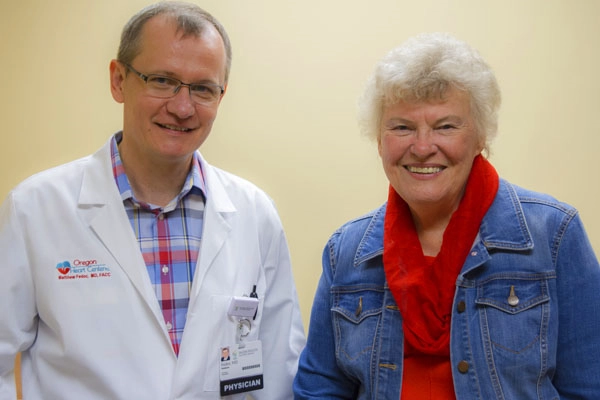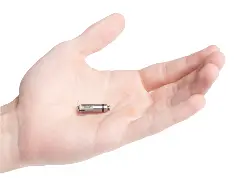Salem Health offers world’s smallest pacemaker

Thanks to the world’s smallest pacemaker, Ruth Bissett of Salem plans to take up line dancing again, volunteer more at her church and keep up with her big, growing family.
On Oct. 10, she became the first patient at Salem Hospital to receive the new Medtronic Micra® pacemaker (about the size of a large vitamin capsule) during a 25-minute procedure in the Cardiac Catheterization Lab.
The retired bus driver and great-grandmother has a condition known as permanent, or persistent atrial fibrillation, which causes a chronic “fluttering” of the heart that fluctuates between very low and high rates, according to her cardiologist Matthew Fedor, MD of the Oregon Heart Center.
He’d been treating her for about 10 years with medication and non-invasive “ablation” surgery. But when a recent cardioversion (a procedure to restore normal heart rhythm) didn’t work, he knew she was a good candidate for the new pacemaker.
The timing was right because Dr. Fedor recently returned from training on the Medtronic Micra® Transcatheter Pacing System, known as the world’s smallest pacemaker. The Food and Drug Administration approved its use in 2016.
Ruth’s dangerous predicament
“The Micra will keep Ruth’s heart rate in a normal range so we can keep her on the medication she needs to maintain normal rhythm,” he said.
Without consistent rhythm maintained by the Micra pacemaker, her heart rate could dip too low, he explained — which means the medication (commonly known as beta blockers) would lower her heartrate to dangerously low levels.
This lands Ruth in a predicament because without the medication, her abnormal heart rhythm could worsen, leaving her even more drained and light-headed – the symptoms she experienced right before the implant. The Micra came to her rescue, so to speak.
“I can’t even feel it, and the process of getting ready took far longer than the surgery itself,” Ruth said, the morning after her implant. “Many people were praying for me, and I felt a tremendous sense of peace going into surgery. I feel great.”
Salem Health has a state-of-the-art “cath lab,” which made this advancement possible locally. In addition to the Oregon Heart Center, Cascade Cardiology also provides the Micra implant at the lab.
The lab performs the full range of cardiac, interventional radiology, vascular and electrophysiology procedures, and has expanded capacity to meet growing cardiology needs in the Mid-Willamette Valley.
The Micra is one-tenth the size of a traditional pacemaker and is self-contained, which means it has no wire “leads” that can eventually bend and break, a danger with traditional pacemakers.
MICRA facts
- The Micra® Transcatheter Pacing System (TPS) provides patients with the most advanced pacing technology at one-tenth the size of a traditional pacemaker. Learn more and watch the simulation here.

- Bradycardia is the most common condition pacemakers treat. People with this condition have slow or irregular heart rhythms, usually fewer than 60 beats per minute. At this rate, the heart is unable to pump enough oxygen-rich blood to the body during normal activity or exercise, causing dizziness, fatigue, shortness of breath or fainting spells. Pacemakers are the most common way to treat bradycardia to help restore the heart's normal rhythm and relieve symptoms by sending electrical impulses to the heart to increase the heart rate.
-
Unlike traditional pacemakers, the device doesn’t require cardiac wires or a surgical “pocket” under the skin to deliver a pacing therapy. It’s small enough to be delivered through a catheter and implanted directly into the heart with small tines, providing a safe alternative to conventional pacemakers without the complications associated with leads, all while being cosmetically invisible. It automatically adjusts pacing therapy based on a patient’s activity levels.
-
The Micra TPS is designed to be left in the body, but can be retrieved. If patients need more than one device, the Micra can be permanently turned off so it can remain in the body and a new device can be implanted without risk of electrical interaction.
-
The Micra is the first and only transcatheter pacing system to be approved for both 1.5 and 3 Tesla (T) full-body magnetic resonance imaging (MRI) scans and is designed to allow patients to be followed by their physicians and send data remotely via the Medtronic CareLink® Network.
ABOUT SALEM HEALTH
Salem Health offers exceptional care to people in and around Oregon’s mid-Willamette Valley. It comprises hospitals in Salem and Dallas, a medical group of primary and specialty care providers, plus other affiliated services. Visit us at www.salemhealth.org; “Like” us on www.facebook.com/salemhealth; follow us on Twitter: @salemhealth; and view us at www.youtube.com/salemhealth.
Pictured (Matthew Fedor, MD and Ruth Bissett)